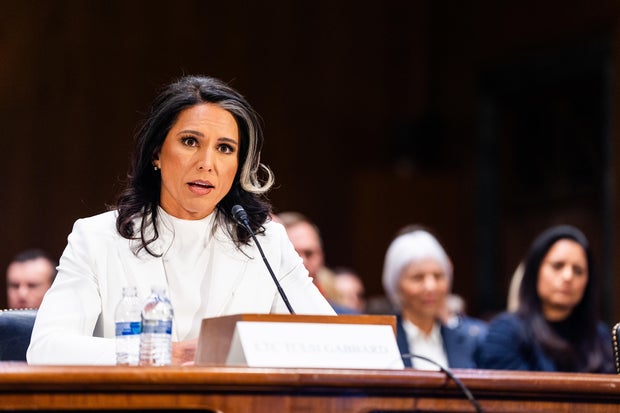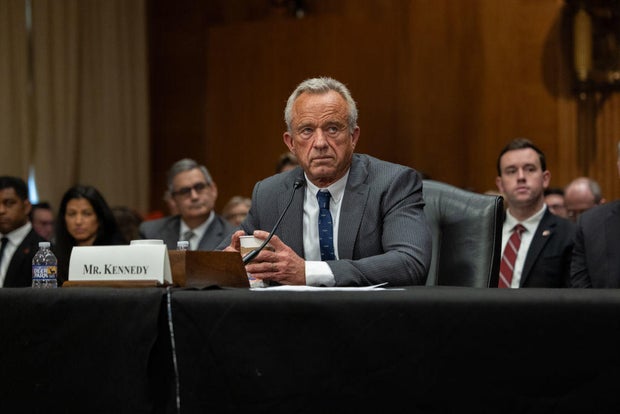Two of President Trump’s most controversial nominees are Tulsi GabbardYour choice of being the director of National Intelligence, and Robert F. Kennedy, Jr.Your choice to lead the Department of Health and Human Services.
After the confirmation hearings last week, the Senate is expected to advance soon with its nominations. But a handful of Republicans who have persistent concerns about them could frustrate or at least complicate their nomination processes. Here are the Republicans to see.
Tulsi Gabbard
The Senate Intelligence Committee plans to vote on the Gabbard nomination on Tuesday. She cannot afford to lose a single republican vote in the committee if all members are present.
Demetrius Freeman/The Washington Post through Getty Images
Susan Collins
Republican senator Susan Collins de Maine, who is in the Senate Intelligence Committee, said Thursday night that he had not made a final decision about Gabbard.
Before Thursday’s audience, Collins said that Gabbard wanted clarity about his position in a key government surveillance authority, known as section 702 of the Foreign Intelligence Surveillance Law. Gabbard, who sought to repeal the controversial law that authorizes the United States government to collect communications from foreigners abroad without a court order, has reversed his position. But Collins said last week that Gabbard’s answer to his questions prior to the audience was “covered and unclear.”
Lisa Murkowski
Like Collins, Senator Lisa Murkowski from Alaska is another Republican who has been willing to break her party into contentious votes. Collins and Murkowski were two of the three Republicans who voted against the confirmation of the Secretary of Defense Pete Hegseth.
Mitch McConnell
Kentucky’s Mitch McConnell Senator was the third Republican who voted against Hegseth and has many opposite opinions with Gabbard, including the controversial positions he has taken in Ukraine, Russia and section 702.
Todd Young
Senator Todd Young, a Indiana Republican, was among the senators of the Senate Intelligence Committee that seemed dissatisfied with Gabbard’s responses about the complainant of the National Security Agency Edward Snowden.
“I think it would be and would make you useful how members of the intelligence community perceive it if at least you recognize that the greatest complainant in American history, the national security call damaged the laws of the Earth. Our authorities of our authorities Intel, “he said at the audience.
Jerry Moran
Senator Jerry Moran, a Kansas Republican, expressed concern during the confirmation hearing about how Gabbard would drive Russia.
“I want to make sure that Russia obtains a pass in your mind or in your heart, or in any policy recommendation to do or not,” he said.
Gabbard told Moran that he was “offended by the question” and said that “no country, group or individual will receive a pass.” He also promised to be “completely objective, impartial and apolitical.”
Moran told Gabbard that he was satisfied with his answer.
John Curtis
On Thursday night, Republican Senator John Curtis de Utah, who swore in the Senate in January, issued a remarkable statement about the Gabbard nomination that indicated that he could potentially oppose her.
“With Mrs. Gabbard, I said it was like having a music blade that was missing notes,” he said. “I hope to listen to today’s audience that she would fill those gaps. Frankly, there are still many notes and a series of sour notes and uncomfortable silences that simply do not sound like a political philosophy on national critical national security problems.
Curtis, who is not a member of the Senate Intelligence Committee, but attended Gabbard’s confirmation hearing, added that “carefully” would review his history before making a final decision on his vote.
Robert F. Kennedy, Jr.
Nathan Posner/Anadolu through Getty Images
The Senate Finance Committee is scheduled on Tuesday to assume Kennedy’s nomination for the Secretary of Health and Human Services. Kennedy underwent two confirmation hearings, one in the Senate Finance Committee and another in the Senate Health, Labor, Labor, Labor and Pension Committee.
Bill Cassidy
Republican senator Bill Cassidy of Louisiana was a doctor for three decades, and at that time, he helped vaccinate many children against hepatitis B. The Republican senator did not hide his serious concerns about Kennedy’s positions in vaccines. Kennedy is in the Senate Finance Committee, which will decide whether to vote for Kennedy outside the committee.
Kennedy in the past repeated the false accusation that vaccines are linked to autism and has expelled many vaccines as insecure.
Cassidy made clear during one of Kennedy’s audiences last week that Kennedy would have to work for his vote. Cassidy told Kennedy that he has been “struggling with his nomination” about his skepticism of the vaccine. The Republican senator said a friend sent him a text message recently that two children died in a hospital in Baton Rouge, Louisiana, due to preventable vaccine diseases last month.
“Then, my concern is that if there is a false note, any socio of a mother’s confidence in vaccines, another person will die from a preventable vaccine disease,” Cassidy said.
Cassidy and Kennedy spoke on Sunday, according to a source familiar with the situation.
Lisa Murkowski
Moderate Republican Senator Lisa Murkowski from Alaska is a Republican to observe whether Kennedy’s nomination advances to the Senate’s floor or when.
Murkowski has also expressed doubts about Kennedy’s past positions in vaccines. Before Kennedy’s confirmation audiences, Murkowksi said he still had worries.
“Well, I’m certainly worried about that. “But vaccines are important.”
Susan Collins
Republican senator Susan Collins de Maine is another Republican to observe whether Kennedy’s confirmation advances. Collins, another moderate and the only member of any of the New England cameras that is Republican, is also considered a key vote.
Collins has challenged Kennedy in his hope of removing some funds from the investigation of infectious diseases, and pressed Kennedy about his past vaccines. Collins expressed concern that fewer vaccinated children could mean losing the so -called immunity to flock.
Last week, hundreds of medical care professionals from Maine presented a letter to Collins, urging her to oppose the nomination of Kennedy, calling him “dangerous.”
Mitch McConnell
The former leader of the majority of the Senate, Mitch McConnell, a survivor of polyomyelitis that still deals with the ramifications of the disease that contracted in childhood, is also a Republican to see in Kennedy.
Kentucky’s Republican is a firm vaccine defender, and warned Kennedy not to undermine them.
“The polyomyelitis vaccine has saved millions of lives and has considered the promise to eradicate a terrible disease,” McConnell said. “The efforts to undermine public trust in proven priests are not only uninformed, they are dangerous. Anyone who seeks the consent of the Senate to serve in the incoming administration would do well to even avoid the appearance of association with such efforts.”
After McConnell voted against Hegseth, Trump indicated that McConnell opposed some of his nominations, saying that “of course, Mitch is always a vote without a vote, I suppose.”
and
contributed to this report.
















